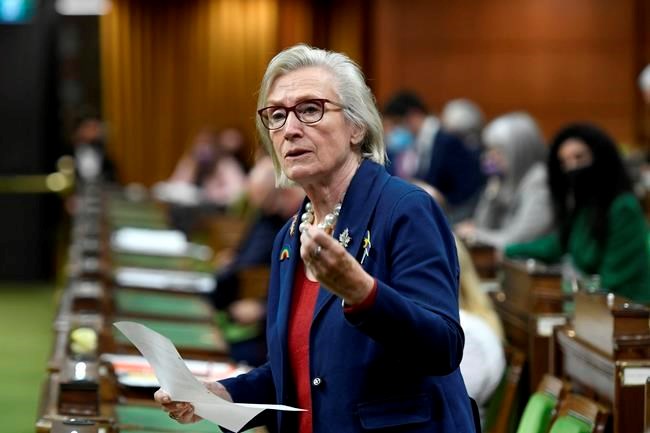OTTAWA — More than a year since the federal government's expert task force recommended it create a safe supply of substances to reduce people's reliance on toxic street drugs, the government has not created any system to procure one.
Carolyn Bennett, the federal minister of mental health and addictions, said in a recent parliamentary committee hearing that the government is building toward a plan to address the opioid crisis.
But she was less clear on what steps it is taking toward sourcing a safe supply.
"I think clearly they don't have a plan around safe supply," NDP MP Gord Johns said in an interview.
Johns, the party's mental health and harm reduction critic, said Bennett has been vague on how she would deliver safe supply.
A regulated and safe supply of opioids would ensure people don't rely on the unregulated and highly dangerous drug supply on the street, according to the June 2021 recommendations from Health Canada's Expert Task Force on Substance Use.
In response to a question about safe supply, Procurement Minister Filomena Tassi told a House of Commons committee of the whole in May that she will make procurement decisions based on requests that come from Health Canada, and that she works with provinces and territories through the health minister.
In a Commons health committee meeting in June, Johns asked Bennett about what actions she is taking to scale up safe supply.
Bennett said though the government has approved diacetylmorphine, or injectable heroin, as a new treatment option for people with severe opioid use disorder, "the Pharmascience company is not ramping up to produce it."
She mentioned other regulated substances such as Dilaudid and powdered fentanyl, but said doctors need to be able to prescribe them.
Despite Bennett's comments, "she hasn't even reached out to ask the procurement minister to procure safe supply," said Johns, who added the government needs to look at a model for safe supply that has low barriers for people who need it.
Referencing the government's work to procure COVID-19 vaccines during the pandemic, Johns asked why it is not doing the same for safe supply.
"It's because it lacks political will, it's not their priority, and they lack courage," he said.
Bennett's office did not directly respond to a question about whether she and Tassi have been working together to procure a safe supply of opioids.
"The provision of contracts for a safer supply of opioids is primarily a provincial and territorial responsibility," Bennett's office said in a recent statement.
Health Canada is currently supporting 17 safer supply projects in British Columbia, Ontario, Quebec, and New Brunswick, for a total investment of more than $64 million, her office said.
Natasha Touesnard, executive director of the Canadian Association of People Who Use Drugs, said she doesn't think the government offering safe supply solely through pilot programs is an effective model because people who use drugs will get uneven opportunities for services depending on where they live.
The government's slow action on safe supply shows it does not value the lives of people who use drugs, said Touesnard, who was a co-chair of the expert task force and questioned why the government is not acting on its own task force's recommendations.
"Why are we still stagnated in this crisis? We live in vicarious trauma, desperation, losing people that we love every single day, and it is so traumatizing to our community to not have government support to make a change," she said, adding that safe supply would save lives and reduce other types of overdose harms.
"It's a waste of everybody's time to actually sit at the table and have these conversations, and then just put it on a shelf to collect data," Touesnard said.
She added it would also be fiscally irresponsible to stay the course, with taxpayers footing the health-care costs of those who use the illegal toxic drug supply.
The expert task force said in its report last year that there is an "urgent need" for safe supply to address the overdose crisis.
It recommended that an expert committee be stood up to lead the design of a "national safer supply program" for up to one million Canadians who it stated are at risk of death from drug toxicity.
Since 2016, more than 29,000 Canadians have died from apparent opioid-related causes, according to the Public Health Agency of Canada.
Such deaths have increased dramatically since the outset of the COVID-19 pandemic, and death rates have remained high since then, the agency reported in June.
Touesnard repeated a frequent observation that has been made in the community affected by the crisis: "It seems like they talk — we die."
This report by The Canadian Press was first published July 12, 2022.
---
This story was produced with the financial assistance of the Meta and Canadian Press News Fellowship.
Erika Ibrahim, The Canadian Press



